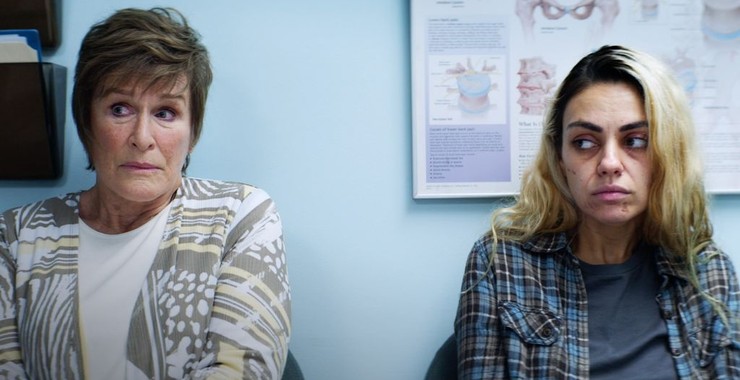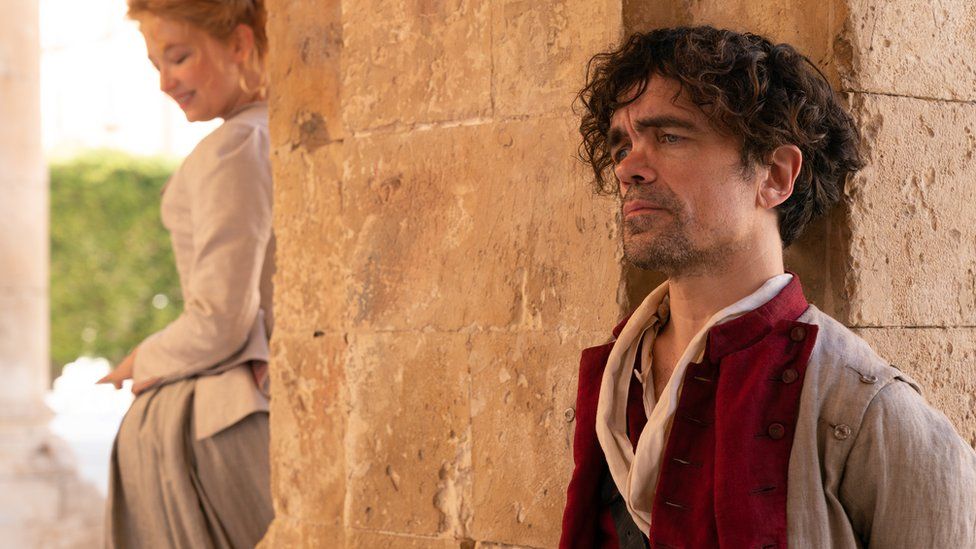Well folks, the last major hurdle of this year’s Oscar Blitz is complete. With the viewing of Great Freedom last week, all films to view in and around the ceremony have been seen. I can officially close the book on the 2021 cinematic canon. We’ve still got two more weeks left of Oscar coverage, of course, but all the prep work is done.
All that remains is to log the final two films into the overall ledger and review them. In both cases, these were movies I kind of wanted to avoid. I had nothing against the first from a thematic aspect, and my ex and I made plans to see it multiple times, especially because it went quickly to streaming and on-demand services after an extremely limited theatrical run. It just took forever to get around to it, and honestly, once I saw that Diane Warren had written a single for the film, I steered clear in hopes that, for once, the Music Branch would stop placating this ballad-spewing hack. Sadly, my fears were entirely justified, and just like other bad movies that I knew would get nominated for something (looking at you, Cruella), I should have made it a priority to just get it out of the way.
The second was one that was clearly Oscar bait from beginning to end. You could even tell by the film’s release schedule. It had a very limited one-week run in late December to ensure its eligibility. Then it was pulled from theatres so the studios could focus solely on the marketing campaign and try to drum up interest for the second limited release in January (which was eventually scrapped), and the wide release in late February. The strategy was clearly to make people want to see it without allowing them to – so they couldn’t know that it wasn’t as great as advertised – in hopes that it could swing a few nominations in order to boost box office. It only got one nod, in the most obvious category for movies of its nature, and basically bombed at the box office, making back only 1/6 of its budget across those three months.
So let’s quickly go through these final two films. That way, when the Blitz resumes tomorrow, it’s full speed ahead, knowing we’ve got all our bases covered!
Four Good Days

Nominated for Diane Warren’s “Original” Song (seriously, you could interchange it with more than half her catalog and not tell the difference) that only plays during the credits, Four Good Days is a very formulaic story about addiction and the bonds of family. The plot is so rote that it could easily be an afterschool special, but it’s saved by pretty stellar lead performances.
In a rare dramatic role, Mila Kunis stars as Molly, a drug addict in her early 30s. The film opens with her arriving on the doorstep of her mother, Deb (Glenn Close, reliably great as ever), asking to stay, as she’s got nowhere else to go. This is a tune that Deb’s heard way too many times before, so she refuses, believing that it will only enable Molly to avoid seeking real help to get clean. After a night sleeping on the porch, Deb agrees to take Molly to detox, despite her own misgivings, as well as those of her husband Chris (Stephen Root).
This is Molly’s 15th attempt at sobriety, and if nothing else, the makeup team did a really good job at making Mila Kunis look like a junkie, her arms dotted with puncture wounds, her teeth ground to broken, jagged nubs. It’s quite well done. Anyway, after a few days (the limit of what Deb’s Medicaid will pay for), Molly is presented with a last ditch treatment option called an opioid antagonist. Essentially, it prevents Molly from getting high. It’s a monthly injection that will allow her to completely withdraw from her dependencies, but there’s a catch. She can’t have other substances in her system when she takes the shot, or there could be severely dangerous side effects. After her time in detox, she still needs to go four days without using again in order to flush everything out and be able to get the shot, hence the title.
Deb allows Molly to move back in so that she can be supervised, and slowly but surely she begins acclimating to normal life again. She gets to see her ex (Joshua Leonard from The Blair Witch Project) and children again. After running into one of her coaches from high school (Rebecca Field from the 2018 A Star is Born remake), she agrees to speak to students about her addictions, and there’s some genuine pathos and harsh truths in that scene, particularly when one of the disinterested teens scoffs that she’d never let herself sink so low, even though Molly herself was an honor student until the pressures of her school and home life led to her turning to drugs as an outlet.
There’s a lot to get behind with this. Kunis definitely gives the best performance she’s had since Black Swan, and Close shoulders a lot of the film’s emotional weight. Together, they drag this well-worn format out of the realm of maudlin dreck through sheer force of will. There’s nuance in the various approaches to the problem along with some pretty blunt honesty about just how hard overcoming addiction can be.
My one major issue, and it’s one that knocks the movie down several points, is the ending. I won’t go into too much detail, but suffice to say, given the stakes and the timeframe at play, it’s amazing to me how easily the film glosses over the resolution. We go along, have one pretty major setback, and then we just flash forward to the end with everything working out. We never actually get what the title promises. I was dumbfounded. How could you build up so much goodwill just to shatter it for the sake of narrative convenience? It’s the one way that the idiotic Diane Warren ballad almost makes sense. It’s called “Somehow You Do,” and that pretty much sums up how the film wraps itself up. I can see Mila Kunis asking writer-director Rodrigo Garcia, “How is Molly going to overcome her addiction? How will she do what’s necessary to save her own life and at least get back to okay?” and Garcia just shrugging his shoulders and saying, “Somehow, you do.” What a letdown after such a promising crescendo.
Grade: B-
Cyrano

There’s a reason I included this in the December edition of TFINYW. There’s just not all that much there with this movie, certainly not enough to justify an Oscar campaign. It’s just another musical adaptation, and another retelling of the Cyrano de Bergerac story, only this time, instead of having a prominent nose, Cyrano is a little person, played by Peter Dinklage.
Now, don’t misunderstand. I fucking LOVE Peter Dinklage! He’s one of the best actors working today, and he’s by far the best thing about this film. For all its flaws, he makes me believe he’s Cyrano. He’s got that rapier wit that Dinklage taps into so naturally no matter what role he plays. His eyes convey his poet’s soul and pain. Even his swordplay skills are impressive. In most scenes, he’s the only one lending this film any real credibility. But he can’t work miracles on his own.
You all know the story by now. Cyrano harbors a secret love for Roxanne, played by Haley Bennett, but she has eyes for another, a new soldier named Christian, played by Kelvin Harrison, Jr. Heartbroken but determined to make Roxanne happy, Cyrano takes the earnest but dullard Christian under his wing, using him as a mouthpiece for his lyrical longings until the whole thing ends in tragedy. This is a story that’s been adapted numerous times, to the point that the life of the real Cyrano de Bergerac is all but lost to everyone who’s not an historian.
All three lead actors bring something to the table, but it’s just not enough. Dinklage has his charm and superior acting chops. Harrison is a remarkably good singer. Bennett’s got huge… tracts of land! But there’s almost no chemistry between any of them, and director Joe Wright keeps everyone at arm’s length from each other unless absolutely necessary. That may be a side effect of pandemic filmmaking, but it still detracts from the proceedings. In a story about the quest for intimacy, it’s amazing how distant everyone is for large chunks of the film. Even when the actors are allowed to be close together, Wright shoots them from a considerable ways away, creating the need to fill the frame with extraneous bullshit. Take for example the first real conversation between Cyrano and Christian. They sit side-by-side on the right side of the screen, their backs leaning against a wall, while a cadre of soldiers spar with one another in rigid lines in the background. The problem is, the other soldiers take up more of the screen than the people we’re supposed to pay attention to, and that just doesn’t work. The only thing that will draw your eyes away is the fact that everyone speaks with a different accent despite the film taking place in France. Bennett and Harrison go for British accents, the villainous Duke De Guiche (because Ben Mendelsohn always has to be the bad guy) wavers between French and British, and Dinklage himself just uses his normal speaking voice, born and raised in New Jersey.
Having this be a musical doesn’t really add anything to the equation, either. Most of the songs are bland, and only Harrison makes the most of the vocal opportunities. Dinklage does alright, enough to not need Auto-Tune, but only just barely. It’s really telling that the only bit of music that moves you at all is a mournful piece called “Wherever I Fall” very late in the film, and it’s performed not by our leads, but by three random members of the guard, the first verse going to the legendary Glen Hansard from Once. That’s it. The rest of the music serves no purpose other than to pad the runtime.
As Cyrano stories go, this isn’t horribly botched or anything. It’s just fine. But if you’re gunning hard for Oscars, fine isn’t nearly good enough. And this film shows exactly why. United Artists and Universal honestly thought they could trick voters into giving this a bunch of hardware rather than simply making a film worthy of it. As it stands, it got a pity nomination for Costume Design, and even that was a stretch. Dinklage does everything in his power to save it, and he is endlessly entertaining when he’s allowed to go full Dinklage, but that’s the lone bright spot in this otherwise pedestrian outing.
Grade: B-
Join the conversation in the comments below! How many films did you see for the 2021 canon? What are you most looking forward to for 2022? Did either of these films deserve Academy consideration? Let me know!

One thought on “Back Row Thoughts – And the Rest… of the Blitz”